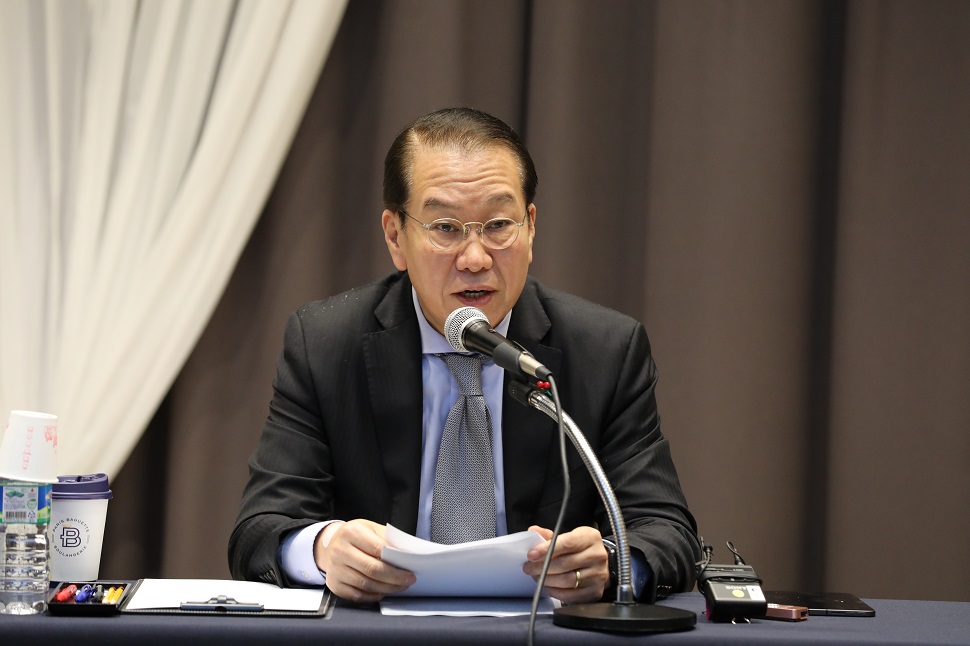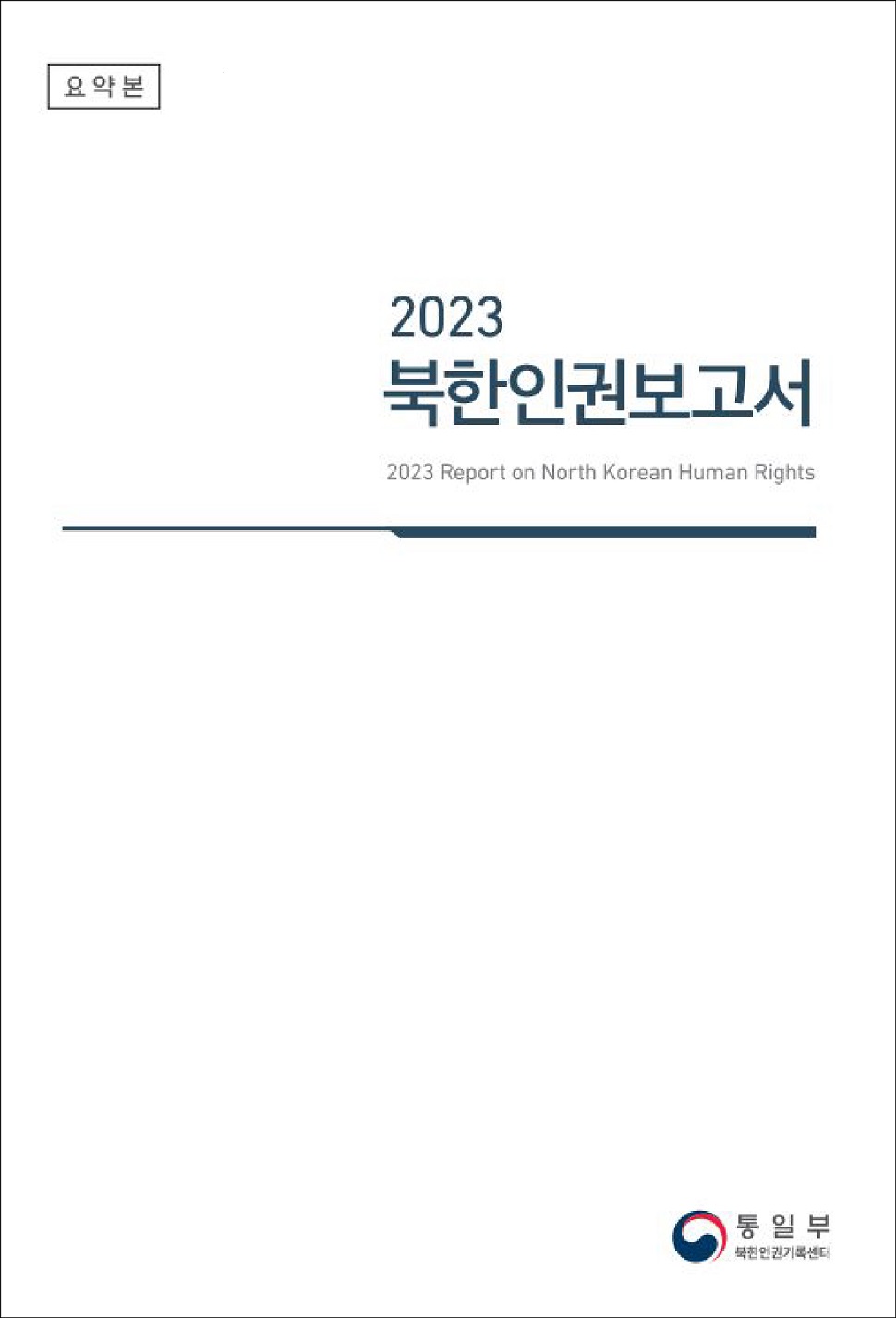[Apr] South Korea issues its first public report on human rights abuses in North Korea
Date Apr 21, 2023
 Unification Minister Kwon Young-se speaks during a press conference in Seoul, December 13, 2022. The ministry recently disclosed its annual report on human rights abuses in North Korea. (Courtesy of Ministry of Unification)
Unification Minister Kwon Young-se speaks during a press conference in Seoul, December 13, 2022. The ministry recently disclosed its annual report on human rights abuses in North Korea. (Courtesy of Ministry of Unification)
The South Korean government recently published a report on human rights abuses in North Korea, revealing the reclusive regime’s brutal acts such as public executions of pregnant women and children.
The 450-page report was disclosed by the Ministry of Unification on March 30 in accordance with the North Korean Human Rights Act, which was legislated in 2016 and requires the ministry to issue a report annually on the human rights situation in the North.
This is the first time the report was released to the public. Although the government has been compiling the report every year since 2018, the liberal Moon Jae-in administration had classified the reports as confidential, citing the need to protect the identity of North Korean defectors whose testimonies were included.
In a departure from the policy of his predecessor, President Yoon Suk Yeol believes that publicly addressing the reality of the human rights situation in the authoritarian state is a basic requirement for improving conditions there.
“This report is significant in that it is the first publicly released government study conducted as part of the North Korean Human Rights Act that passed across party lines,” a ministry official said, adding that no other government organization has disclosed reports on the North’s human rights issues.
The newly published report detailed some 1,600 cases of human rights violations obtained through interviews with 508 North Korean defectors from 2017 to 2022. The report described rampant state-sanctioned abuses, including extrajudicial killings, torture, unethical human experimentation and the repression of free speech and the press.
“North Korean residents’ right to live is under threat,” the report reads. “The death penalty is meted out even for crimes that are not considered serious offenses, such as using drugs, distributing South Korean videos and practicing a religion.”
According to the report, a woman in her sixth month of pregnancy was publicly executed in 2017 following a widely circulated video of her pointing a finger at a portrait of North Korea’s founding leader Kim Il-sung.
 Summarized report on North Korean human rights published by South Korea’s Ministry of Unification (Screen capture from the Ministry of Unification’s website)
Summarized report on North Korean human rights published by South Korea’s Ministry of Unification (Screen capture from the Ministry of Unification’s website)
In 2015, six minors aged 16 and 17 accused of watching South Korean cultural content and using an illegal narcotic were executed by firing squad.
The defectors also testified that women in detention centers often face inhumane treatment that includes sexual and physical assaults by prison guards. A woman who was jailed after attempting to cross the border to China was forced to have an abortion when she was three months pregnant.
Those participating in religious activities also face punishments. In one case, after a group of people were caught secretly operating a church in Pyongyang in 2019, five were executed in public, seven were sent to prison camps, 30 were mobilized for hard labor and around 50 were forced to relocate to other regions in the North.
The unification ministry estimates that the North has at least 11 political prison camps with five currently in operation.
Some defectors also claimed that the regime has been conducting unethical medical experiments on physically and mentally disabled people without obtaining consent from the individuals or their relatives.
The report included testimonies that people with dwarfism were forced to move to a remote town designated by the state. Some women with dwarfism were coerced to undergo hysterectomies to prevent future pregnancies.
Also, people caught accessing information on South Korea or smuggling drugs have been forcibly relocated. And many arrested by the authorities for engaging in religious activities, criticizing the regime or taking part in human trafficking have gone “missing.” Defectors believe the missing have either been killed or placed in prison camps.
“The report shows our government’s determination to improve human rights in North Korea through an increase in practical efforts,” Unification Minister Kwon Young-se said in the preface of the report.
“We hope the report will contribute to leading the North Korean regime to pursue meaningful change in its behavior and take responsible actions. Until the day the North Korean people enjoy humane living conditions, we will work in solidarity with the international community toward improving the human rights situation in the North.”
The ministry is posting the report online and distributing 2,500 hard copies, both of which are currently available only in Korean, as reference material for studies or policies related to the North’s human rights issues. The ministry intends to continue issuing the report every year, but if the number of North Korean defectors in a given year is not large enough to provide meaningful data, the report could be released biennially. The English version of the 2023 report will be released soon.
The North Korean regime has long been labeled as one of the worst human rights violators in the world, but it bristles at outside criticism of its human rights violations.

The Ministry of Culture, Sports and Tourism's "Korea Here & Now" work can be used under the condition of "Public Nuri Type 1 (Source Indication)."




